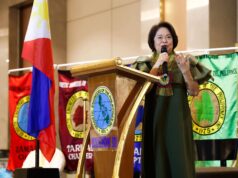The Securities and Exchange Commission (SEC) is proposing key amendments to the rules governing real estate investment trusts (REITs) to provide broader opportunities in the capital market for issuers and investors alike.
The Commission on November 18 released for public comment the proposed amendments to SEC Memorandum Circular No. 1, Series of 2020, or the Revised Implementing Rules and Regulations of Republic Act No. 9856, otherwise known as the Real Estate Investment Trust Act of 2009.
The draft amendments seek to broaden the list of income-generating real estate assets that may comprise a REIT’s portfolio, provide flexibility for the REIT sponsor in reinvesting proceeds from the listing of the REIT, and relax the minimum public ownership requirement, among others.
“The proposed reforms will help ensure that the REIT framework remains robust and responsive to evolving market needs, thereby enabling the real estate sector to unlock more capital that will further support their growth and to contribute more to the development of our economy,” SEC Chairperson Francis Lim said.
Expanded definition of income generating assets
The proposed amendments expand the definition of income generating real estate assets by allowing a REIT to directly or indirectly own income-generating real estate through a shareholding in an unlisted special purpose vehicle (SPV) wholly owned by the REIT and duly constituted to primarily hold or own real estate.
The SEC is also proposing to include within the definition of income-generating real estate those real properties with regular streams of income, or those with recurring and predictable cash inflows derived from the lease of, or other similar arrangements involving such properties.
These may include rental properties from transportation, information and communications technology, and energy infrastructure assets; parking lots; buildings; malls; warehouses or storage facilities; immovable fixtures, machineries, facilities, and structures; and real rights over properties including but not limited to usufruct, easements, registered leases. Accordingly, more
companies may be classified as REITs under the amended rules—effectively expanding the scope of real properties that may comprise a REIT’s portfolio.
Reinvestment period and proceeds
Meanwhile, the draft circular extends the period for the utilization of reinvestment proceeds to two years, from the previous standard of one year from the date of receipt of the proceeds.
Reinvestment in the Philippines may take the form of investment in equity, the extension of loans or purchase of debt instruments or the repayment of loans or debt instruments in relation to any real estate or infrastructure project—both government and privately initiated—in the Philippines.
Minimum public ownership
The SEC is further relaxing the compliance with the minimum public ownership (MPO) requirement for REITs, allowing for a temporary dip in instances when there is an issuance of additional shares to its sponsor/promoter or the latter’s affiliates in exchange for income-generating real estate or real rights over immovable property, subject to certain conditions.
The temporary dip in MPO may be allowed when the transaction has been duly approved by the Commission and the Exchange; when it submits a plan and timetable to the Commission on how the MPO requirement will be restored; and when the REIT publicly discloses the temporary breach and the remedial plan in its structured reports and on its website.
The SEC is accepting comments for the proposed draft until December 3. The public may send their comments via email at ipsd_msrd@sec.gov.ph, eavalencia@sec.gov.ph, or ggjarugay@sec.gov.ph.





